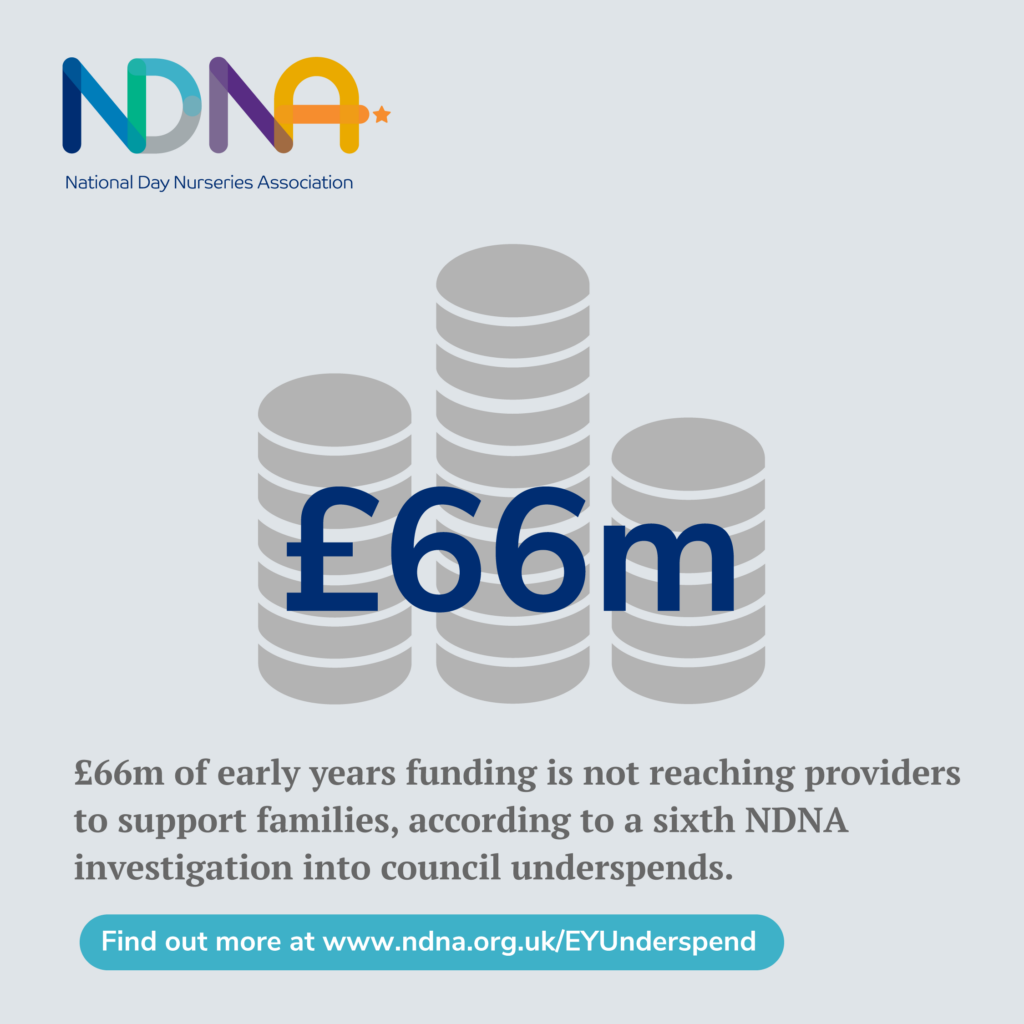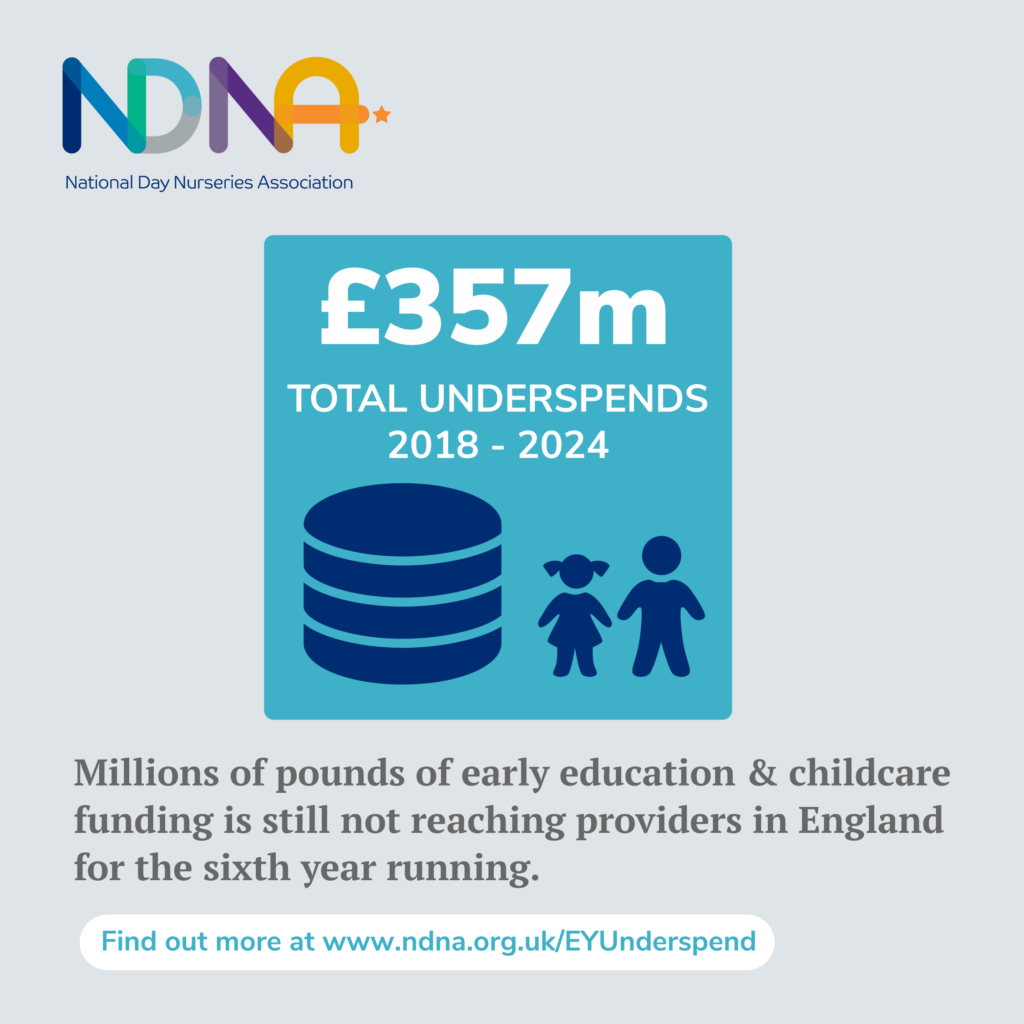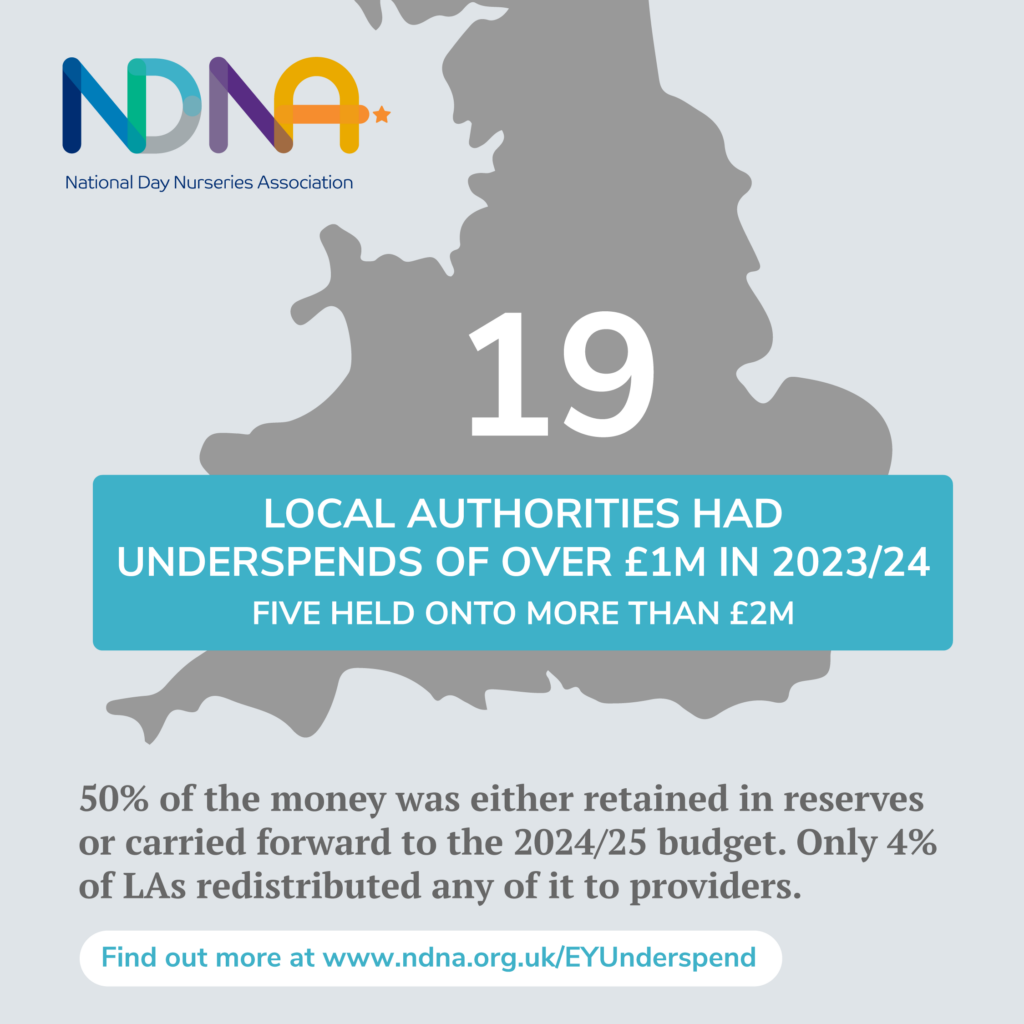
As nurseries face NIC hikes, research shows more than £65m of early years funding goes unspent
A new investigation into ’free’ childcare funding for two to five-year-olds across England has uncovered continuing levels of underspends, according to National Day Nurseries Association (NDNA).
NDNA discovered that 75% of the 132 local authorities who responded to its Freedom of Information (FOI) request had underspends. This meant that a total of more than £65 million in early years entitlement funding, had not been spent on funded places at the end of 2023/24.

These findings are being published as nurseries have to implement new statutory pay increases and changes to the employer National Insurance Contributions from this week. Analysis from NDNA suggests this will add around £2,600 a year per employee or £65,000 a year for a small enterprise nursery employing 25 staff.
This is the sixth year running that NDNA has reported on how councils in England distribute their allocated early years funding. Cumulative underspends from 2018 to 2024 amount to almost £357 million.
Out of the 129 councils who responded to questions regarding to actions agreed as a result of their underspends and overspends, only 4% said they re-distributed funds to early years providers. These included Hampshire, Suffolk and Nottinghamshire.
NDNA’s Executive Chair Purnima Tanuku CBE said: “We are committed to looking at local authority budgets every year because we keep finding money allocated for children’s funded places, not being spent for that purpose.
“This time it was almost a hundred local authorities telling us they had money left over from the 2023-24 budget. This is early years money which is crucial at this extremely challenging time for providers and parents. These are resources that must be used to provide high quality education and care to our youngest children.

“Over the years we have tracked well over £350 million in underspent early years budgets and a tiny proportion of this has actually made it back to the providers on the front line.
“The Government has made a commitment to supporting parents and delivering on the expansion of funded hours, but the current way of funding early education and care places is not fit for purpose. It does not ensure resources reach the children who are entitled to is and it does not support providers equally.
“Private and voluntary nurseries are being asked to find more money for NICs, rising business rates bills and getting mixed messages on charging policies for meals, consumables and activities which aren’t funded through government rates. At the same time, school based nurseries are reimbursed for NIC costs and business rates and are receiving additional funding from the Government, it risks creating a two-tier system.
“Every day we are hearing from nurseries who are worried about how they can remain open and how they will deliver more hours on the funding rates they currently receive. At this crucial time the Government should be working with local authorities to ensure every penny supports the front line.

“From September the early years budget will have effectively doubled with the roll-out of 30 hours for children from nine months old. Putting double the resources through a leaky and overly complicated funding pipeline is a recipe for disaster.”
Teachers’ Pay and Pensions Grant
During the financial year 2023/24 the TPPG (Teachers Pay and Pensions Grant) was added to early years budgets for the first time.
NDNA’s FOI also asked local authorities how much additional funding they received in the early years block and what decisions were made about how the TPPG funding uplift was distributed.
Where local authorities were able to provide this information, only 40% said they made TPPG funding available to all PVI providers, adding it to the three and four-year-olds hourly rate.
A further 36% said that no PVIs were eligible for TPPG and that it went to schools and maintained academies. Only 22% of councils distributed the TPPG funding uplift to those providers with teachers and 2% of councils did not have the information.
Commenting on the TPPG, Purnima Tanuku CBE added, “The approaches from local authorities have created a real postcode lottery for providers. This grant was supposed to boost funding rates which could support providers to recruit more qualified staff.
“What we have seen is a completely mixed picture leaving some PVI providers with teachers completely excluded from any additional support via this grant.”
More detail on Underspends and Overspends
Out of the 99 local authorities that reported an underspend, NDNA found 19 cases of underspends that were more than £1m and five councils that held onto more than £2m. These included Leicester, Lancashire, Gloucestershire, Worcestershire and Essex.
While Essex County Council reported the largest underspend of £10.3m at the end of 2023/24, we understand they expected a large portion of this to be adjusted after the end of the financial year.
NDNA also found that 21 councils reported overspends amounting to £7m. This figure is only slightly lower than 2022-23, at £7.4m. Where councils overspend, they must recover funding from future years meaning funding rates to providers can be lower.
When asked about actions agreed with regard to any underspends, most of the money was either retained in reserves or carried forward to the 2024/25 budget (50%). A further 24% of councils used the underspends to offset deficits; of which 15% were specifically used for the high needs block.
Out of the remaining respondents, ten local authorities balanced their budgets and two reported overspends but did not confirm the amount (Croydon and Wandsworth).
The average pass-through rate was reported to be 96% across the 134 councils who responded to the question. Of these, 45 said they passed through exactly 95% and 86 passed above 95%. Two councils reported a pass through rate below 95%, West Northamptonshire (93.1%) and Hartlepool (92.4%). One local authority did not provide an answer.
Responses in numbers:
• Responses from 137 out of 151 councils although some left some questions unanswered or gave unclear answers to some of the questions
• 99 councils (75% of respondents) reported an underspend totalling £65,747,256.88
• 19 LAs reporting more than £1m each (14%) – highest £10.3m Essex (see chart below)
• Of these £1m+ councils, 6 put this money in reserves; 5 Carried forward to 2024/25 budget, 5 offset deficit in high needs block, 1 offset deficit in schools block, 1 said no action has been agreed and 1 did not answer the question
• Of the 99 LAs with underspends, 5 (5%) passed all or some to providers
• 64 put their underspends into reserves or carried it forward to next year’s budget – 64% of those with an underspend
• 6 hadn’t agreed any actions re their underspend – 6%
• 30 used underspends to offset deficits (30%); 19 of these specifically were used for high needs block (19%)
• 21 councils (16% of respondents) reported an overspend. This totalled £7,037,125.71, slightly less than the previous year totalling £7,369,734
• 10 LEAs reported their accounts as exactly balanced – ie. they had no money left over or overspent
The FOI:
NDNA put out a Freedom of Information (FOI) question to 151 local education authorities in October 2024 regarding whether they had an underspend or an overspend once 2023-24 accounts had been finalised. NDNA also asked what percentage of PVI providers were eligible for TPPG funding and how this was distributed. A total of 137 councils responded although information from five local authorities was unclear regarding underspends and could not be analysed.
- England
Similar Articles
Maths confidence soars as three early years settings complete NDNA’s Maths Champions programme

Government guidance could put nursery children and staff at risk


